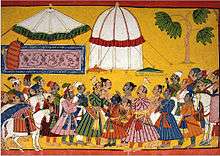Janaka
| Janaka | |
|---|---|
 Janaka welcoming Rama and his father Dasharatha in Mithila Nagari | |
| Information | |
| Spouse(s) | Sunaina |
Janaka (also spelled Janak; Sanskrit: जनक[note 1]) is the name used to refer to the kings of Videha. The Videha (or Mithila) kingdom was located between east of Gandaki River, west of Koshi River, north of Ganga river and south of Himalayas. The region is now divided between the present day Indian state of Bihar and a small part of Terai Region in Nepal. Janaka Dynasty ruled the Videha kingdom from their capital, Mithila Nagari. A certain King Janaka, who probably reigned during the 7th century BCE,[1] is mentioned in the late Vedic literature as a great philosopher-king. A King Janaka is also mentioned in the Ramayana epic.
Janaka is the father of Sita, the heroine of the Hindu epic Ramayana. His conversation with Ashtavakra is recorded as Ashtavakra Gita, wherein he is depicted as one realised and this tested by the sage Ashtavakra. Many spiritual teachers have referred to this writing often translating and deducing its meaning.[2][3]
Janaka in Vedic literature
.png)

Late Vedic literature such as Shatapatha Brahmana and Brihadaranyaka Upanishad mention a certain King Janaka (c. 7th century BCE)[1] as a great philosopher-king of Videha, renowned for his patronage of Vedic culture and philosophy and whose court was an intellectual center for Brahmin sages such as Yajnavalkya.[1] Under his reign, Videha became a dominant political and cultural center of the Indian subcontinent.[4]
See also
Notes
References
- 1 2 3 Raychaudhuri, H. C. (1972). Political History of Ancient India. Calcutta: University of Calcutta. pp. 41–52.
- ↑ Vanita, Ruth (2009). "Full of God:Ashtavakra and ideas of Justice in Hindu Text". Religions of South Asia. 3 (2). Retrieved 22 February 2017.
- ↑ Mukerjee, Radhakamal (1971). The song of the self supreme (Aṣṭāvakragītā): the classical text of Ātmādvaita by Aṣṭāvakra. Motilal Banarsidass Publ. ISBN 978-81-208-1367-0. Retrieved 19 March 2010.
- ↑ Michael Witzel (1989), Tracing the Vedic dialects in Dialectes dans les litteratures Indo-Aryennes ed. Caillat, Paris, 97–265.
Sources
- Dictionary of Hindu Lord and Legend (ISBN 0-500-51088-1) by Anna Dhallapiccola
.jpg)
